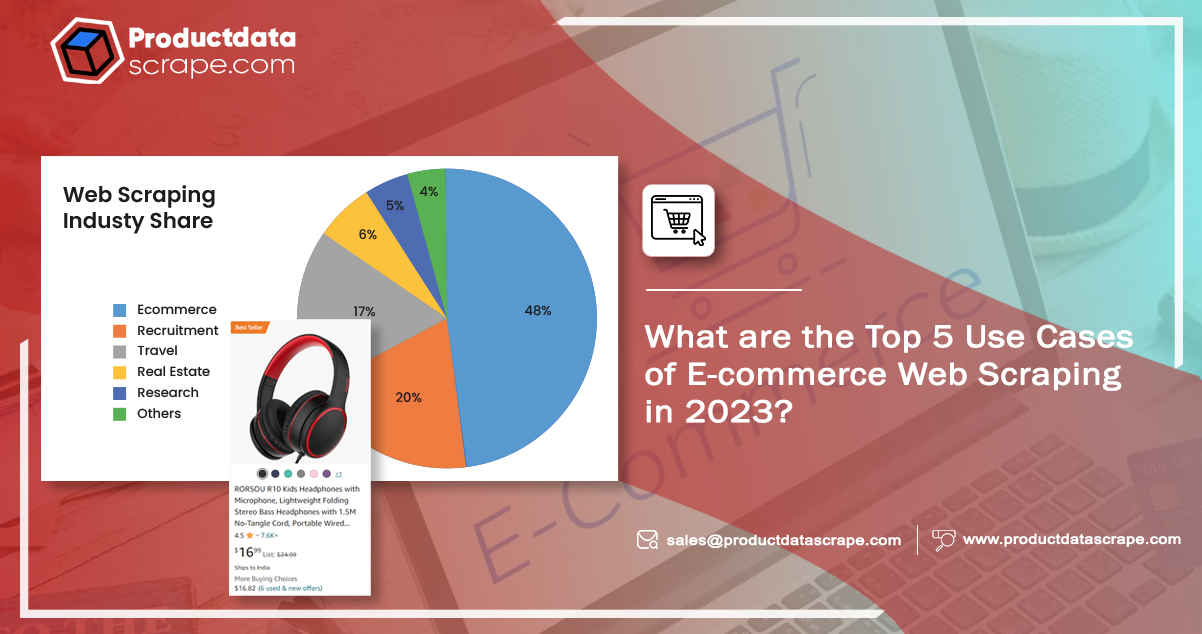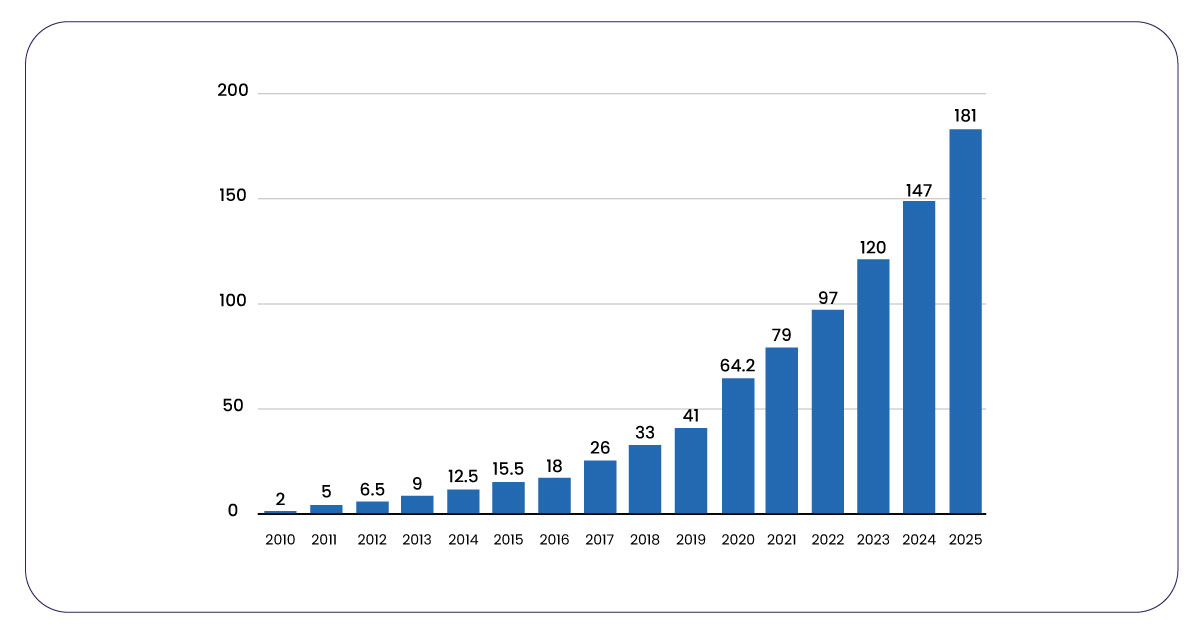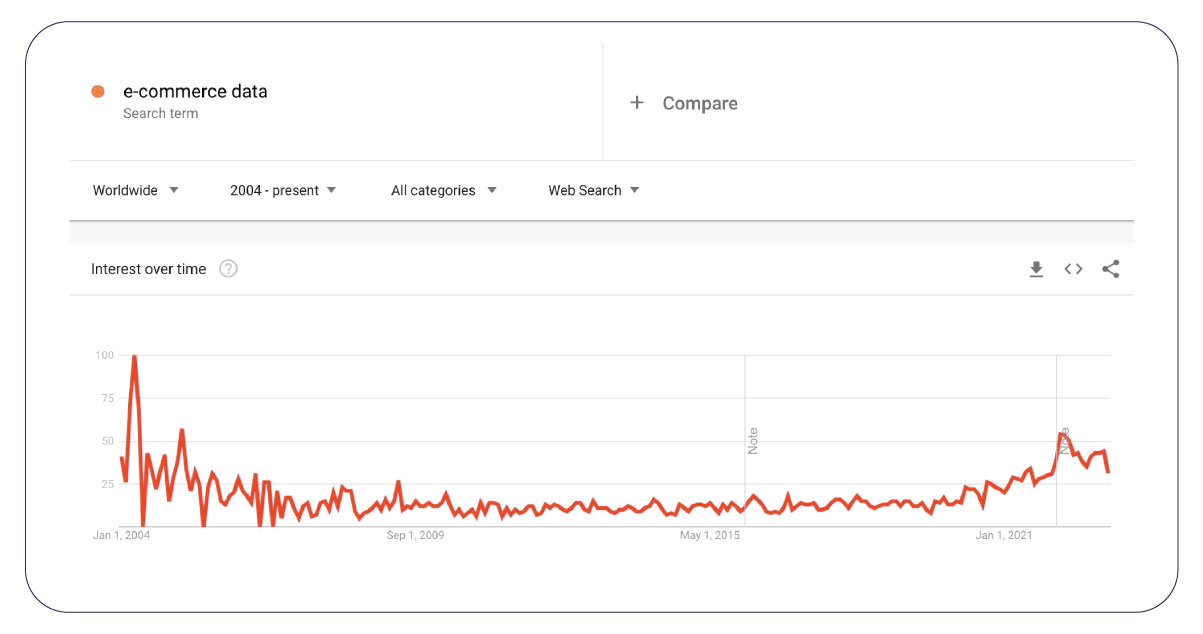
The surge in online data is expediting the integration of data-centric
decision-making approaches in businesses. Research indicates that companies prioritizing
data-driven strategies are significantly more likely to achieve profitability, with a 19-fold
increase, and demonstrate a 52% higher aptitude in comprehending their customer base (refer to
Figure 1). It underscores the critical role of web scraping for enterprises reliant on data,
particularly within online e-commerce platforms. These platforms leverage publicly available
data to:
Analyze Competitors
Monitor Customer Trends
Generate Sales Leads
This article delves into the five primary web scraping applications within
e-commerce using Ecommerce Data Collection Service and addresses the associated challenges of extracting information from
e-commerce websites.
Figure 1: Total Global Data Creation, Capture, Replication, and Consumption from 2010 to 2020,
with Projections up to 2025.

About E-Commerce Data

E-commerce data encompasses various forms of information extracted from e-commerce
platforms and digital retail marketplaces, encompassing:
Customer Information: This entails demographics, search inquiries,
preferences, and purchasing patterns.
Product Details: It encompasses price ranges, stock status,
suppliers, and ratings of items.
Transaction Records: This includes data related to payment
mechanisms, shipping expenses, and applicable taxes.
Most e-commerce data is publicly accessible as these platforms openly present
product and transaction details to their clientele. These data sets can be extracted using
conventional web scraping techniques or automated through Robotic Process Automation (RPA) bots.
Top 5 E-Commerce Web Scraping Use Cases
E-commerce web scraping facilitates the automated retrieval of online
e-commerce data, enabling online marketplaces to harness the power of web scrapers or web
scraping APIs to:
Price Comparison: In the era of dynamic pricing strategies,
gaining prominence, it becomes imperative for enterprises to fine-tune their pricing strategies
in alignment with consumption patterns and competitive dynamics. E-commerce websites data
scraping services aid businesses in comprehending the prevailing product valuation
within the
market, allowing for tailored price adjustments.
Furthermore, web scrapers can be orchestrated to execute near-real-time data
crawls, enabling e-commerce platforms to capitalize on this information to launch promotional
campaigns on products that rivals are showcasing at elevated prices.
Precision Advertising: Web Scraping Retail Websites Data can enhance its effectiveness by incorporating location-specific IP addresses
to retrieve information from particular geographic regions. An IP-enabled web scraper can
provide insights into a customer's buying journey, encompassing search queries, geographical
origins, product ratings, comments, user experiences during setup, and seasonal or cyclical
demands. This wealth of data becomes instrumental in orchestrating precisely targeted campaigns,
capitalizing on geographic nuances, prevailing market trends, and intricate customer behaviors.
Comprehensive Product Analysis: Product research entails
delving into the intricacies of existing market offerings and evaluating the viability of
introducing new products or refining existing ones regarding attributes or pricing. Web scrapers
are valuable tools for extracting diverse product-related information, encompassing visuals,
descriptions, pricing details, reviews, and more. This extracted dataset plays a pivotal role in
discerning:
- Products experiencing substantial demand
- Features that resonate with and hold significance for users
- Emerging niche concepts within the market
Customer Sentiment Assessment:
Gauging customer sentiment holds paramount importance within e-commerce. Web scraping e-commerce
data empowers e-commerce platforms with insights gleaned from customer reviews and feedback,
which prove invaluable for refining existing products or devising tailored new offerings,
informed by consumer behaviors and needs.
Prospective Lead Identification:
Web scrapers can amass customer contact details, including email addresses, phone numbers, and
social media profiles. E-commerce marketers can harness this data to initiate engagement with
potential customers, introducing them to the platform.
The spectrum of web scraping applications extends across marketing and sales,
catering to e-commerce and non-e-commerce domains.
Significant Challenges of Scraping E-Commerce Websites
Automating the extraction of data from e-commerce websites can pose challenges
due to the following:
Interface Modifications: Many e-commerce platforms alter their
formats and typography to enrich the user experience and attract a diverse clientele. These
interface changes necessitate reprogramming the scraping bot to align with the updated content
presentation.
Anti-Scraping Measures: Several e-commerce websites, including
CAPTCHAs, employ anti-scraping mechanisms to verify visitors' human identity and mitigate
network congestion. While CAPTCHAs can pose formidable obstacles for web scrapers, some
solutions incorporate CAPTCHA solvers to overcome this hurdle.
Cloaking: Cloaking involves displaying divergent data to bots
when a website detects its presence. Numerous e-commerce sites adopt cloaking techniques to
serve bots' inaccurate product information or redirect them to irrelevant URLs. However, it's
important to note that cloaking is considered illicit and a violation of Google's Webmaster
Guidelines, often leading to banning such websites from Google Search.
Conclusion: In the evolving e-commerce landscape, web scraping
emerges as a transformative tool, unleashing many strategic possibilities. The diverse use
cases, from dynamic pricing optimization and precise advertising campaigns to insightful product
analysis, sentiment assessment, and effective lead generation, underscore its pivotal role. By
harnessing the power of data extraction, businesses gain a competitive edge, shaping their
offerings and strategies in response to ever-changing market dynamics. In 2023 and beyond,
e-commerce web scraping stands as an indispensable ally, steering enterprises toward data-driven
success and customer-centric innovation in the digital realm.
Product Data Scrape is committed to upholding the utmost standards of ethical
conduct across our Competitor Price Monitoring Services and Mobile App Data Scraping operations.
With a global presence across multiple offices, we meet our customers' diverse needs with
excellence and integrity.


































.webp)






